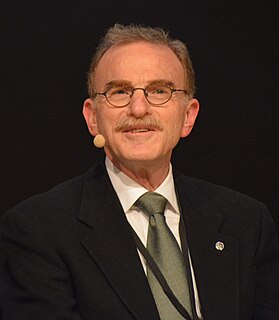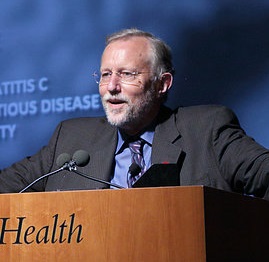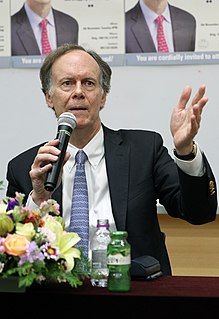Related Research Articles

Eli Lilly and Company is an American pharmaceutical company headquartered in Indianapolis, Indiana, with offices in 18 countries. Its products are sold in approximately 125 countries. The company was founded in 1876 by, and named after, Colonel Eli Lilly, a pharmaceutical chemist and veteran of the American Civil War.

Randy Wayne Schekman is an American cell biologist at the University of California, Berkeley, former editor-in-chief of Proceedings of the National Academy of Sciences and former editor of Annual Review of Cell and Developmental Biology. In 2011, he was announced as the editor of eLife, a new high-profile open-access journal published by the Howard Hughes Medical Institute, the Max Planck Society and the Wellcome Trust launching in 2012. He was elected to the National Academy of Sciences in 1992. Schekman shared the 2013 Nobel Prize for Physiology or Medicine with James Rothman and Thomas C. Südhof for their ground-breaking work on cell membrane vesicle trafficking.
The Canada Gairdner International Award is given annually by the Gairdner Foundation at a special dinner to five individuals for outstanding discoveries or contributions to medical science. Receipt of the Gairdner is traditionally considered a precursor to winning the Nobel Prize in Medicine; as of 2020, 95 Nobel Prizes have been awarded to prior Gairdner recipients.

The Johns Hopkins University School of Medicine (JHUSOM) is the medical school of Johns Hopkins University, a private research university in Baltimore, Maryland. Founded in 1893, the School of Medicine shares a campus with the Johns Hopkins Hospital and Johns Hopkins Children's Center, established in 1889. It has consistently ranked among the top medical schools in the United States in terms of the number/amount of research grants/funding awarded by the National Institutes of Health, among other measures.
The Louisa Gross Horwitz Prize for Biology or Biochemistry is an annual prize awarded by Columbia University to a researcher or group of researchers who have made an outstanding contribution in basic research in the fields of biology or biochemistry.
The Heineken Prizes for Arts and Sciences consist of 11 awards biannually bestowed by Royal Netherlands Academy of Arts and Sciences. The prizes are named in honor of Henry Pierre Heineken, son of founder Gerard Adriaan Heineken, Alfred Heineken, former chairman of Heineken Holdings, and Charlene de Carvalho-Heineken, current chair of the Heineken Prizes Foundations, which fund all Heineken Prizes for Arts and Sciences. Thirteen winners of the Dr H. P. Heineken Prize for Biochemistry and Biophysics or the Dr A. H. Heineken Prize for Medicine subsequently were awarded a Nobel Prize.
The Passano Foundation, established in 1945, provides an annual award to a research scientist whose work – done in the United States – is thought to have immediate practical benefits. Many Passano laureates have subsequently won the Nobel Prize.
Harry Eagle was an American physician and pathologist. He was born in New York City then studied, and later worked, at Johns Hopkins University before moving on to the National Institutes of Health. From 1961 to 1988 he worked at the Albert Einstein College of Medicine. He is best known for Eagle's minimal essential medium, which is important in understanding how human and mammalian cells reproduce. He is also known for the Eagle effect. In 1936 he was the inaugural winner of the Eli Lilly and Company-Elanco Research Award. In 1973, he was a co-winner of the Louisa Gross Horwitz Prize of Columbia University. In 1987, he was awarded the National Medal of Science for his work in the Biological Sciences.

David Jay Julius is an American physiologist and Nobel Prize laureate known for his work on molecular mechanisms of pain sensation and heat, including the characterization of the TRPV1 and TRPM8 receptors that detect capsaicin, menthol, and temperature. He is a professor at the University of California, San Francisco.
The Novartis-Drew Award for Biomedical Research is an award jointly presented by Novartis and Drew University. It comprises a cash award and a plaque. The award was initially created as the Ciba-Drew Award for Biomedical Research and renamed following the change of company name from Ciba-Geigy to Novartis in 1996.
The Massry Prize was established in 1996, and until 2009 was administered by the Meira and Shaul G. Massry Foundation. The Prize, of $40,000 and the Massry Lectureship, is bestowed upon scientists who have made substantial recent contributions in the biomedical sciences. Shaul G. Massry, M.D., who established the Massry Foundation, is Professor Emeritus of Medicine and Physiology and Biophysics at the Keck School of Medicine, University of Southern California. He served as Chief of its Division of Nephrology from 1974 to 2000. In 2009 the KECK School of Medicine was asked to administer the Prize, and has done so since that time. Ten winners of the Massry Prize have gone on to be awarded a Nobel Prize.

The American Association of Immunologists (AAI) is an international scientific society dedicated to furthering the study of immunology. AAI provides its members with a variety of platforms in which to exchange ideas and present the latest immunological research, including the AAI annual meeting and The Journal of Immunology. In 2017, AAI launched an open-access journal, ImmunoHorizons. AAI is a founding member society of the Federation of American Societies for Experimental Biology (FASEB).
Dilworth Wayne Woolley was a Canadian-born American biochemist, who did important work on vitamin deficiency, and was one of the first to study the role of serotonin in brain chemistry. He was nominated for a Nobel Prize in 1939, 1948, 1949, and 1950.

Charles Moen Rice is an American virologist and Nobel Prize laureate whose main area of research is the Hepatitis C virus. He is a professor of virology at the Rockefeller University in New York City and an adjunct professor at Cornell University and Washington University School of Medicine. At the time of the award he was a faculty at Rockefeller.

William G. Kaelin Jr. is an American Nobel Laureate physician-scientist. He is a professor of medicine at Harvard University and the Dana-Farber Cancer Institute. His laboratory studies tumor suppressor proteins. In 2016, Kaelin received the Albert Lasker Award for Basic Medical Research and the AACR Princess Takamatsu Award. He also won the Nobel Prize in Physiology or Medicine in 2019 along with Peter J. Ratcliffe and Gregg L. Semenza.
The 2021 Nobel Prize in Physiology or Medicine was jointly awarded to the American physiologist David Julius and Armenian-American neuroscientist Ardem Patapoutian "for the discovery of receptors for temperature and touch." During the award ceremony on December 10, 2021, Nobel Assembly at Karolinska Institutet member Patrik Ernfors expressed:
"The 2021 Nobel Prize laureates have explained fundamental mechanisms underpinning how we sense the world within and around us. Our temperature and touch sensors are used all the time in every day of our lives. They continuously keep us updated about our environment, and without them even the simplest of our daily tasks would be impossible to perform."
The 2020 Nobel Prize in Physiology or Medicine was awarded to the American virologists Harvey J. Alter, Michael Houghton and Charles M. Rice "for the discovery of Hepatitis C virus." During the award ceremony on December 10, 2020, Prof. Gunilla Karlsson-Hedestam said:
"The discovery of the Hepatitis C virus by this year’s Laureates laid the foundation for our current understanding about how the virus survives in its niche during the long chronic phase of the infection, and how liver disease develops. And importantly, it led to the development of highly effective anti-viral medicines that now cure the infection in almost all treated persons."
References
- ↑ Eli Lilly and Company Research Award at asm.org at the Wayback Machine (archived 2016-03-09)
- ↑ Eli Lilly and Company-Elanco Research Award Past Laureates at asm.org at the Wayback Machine (archived 2016-06-11)